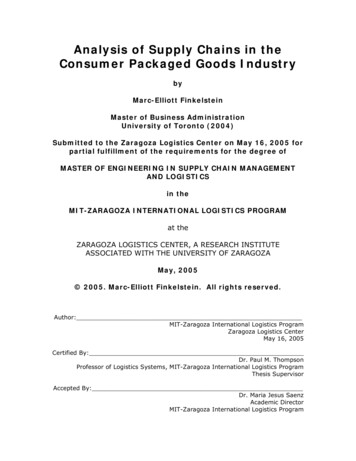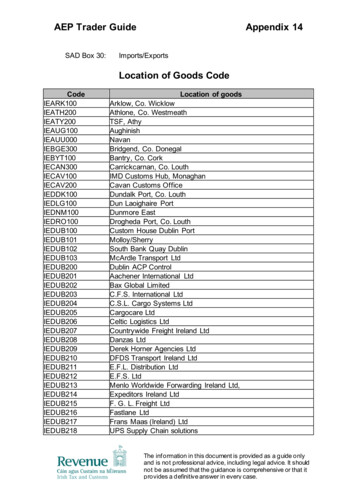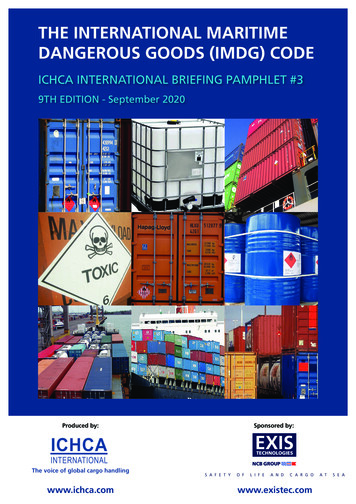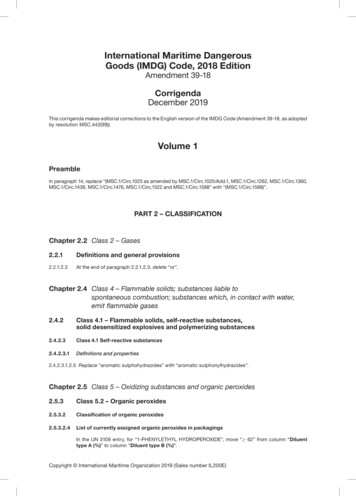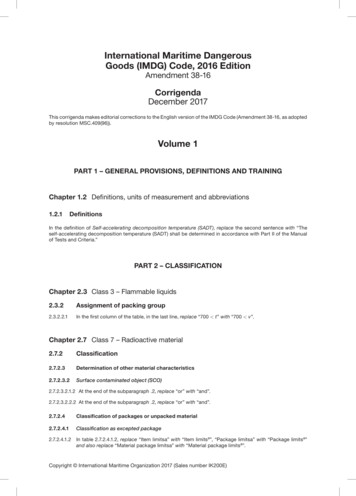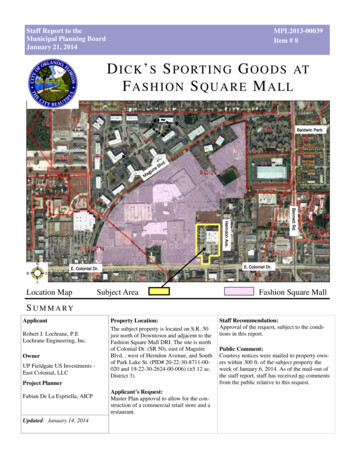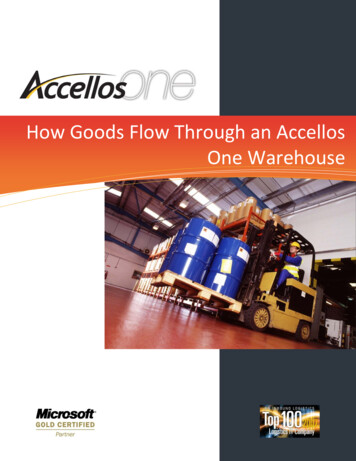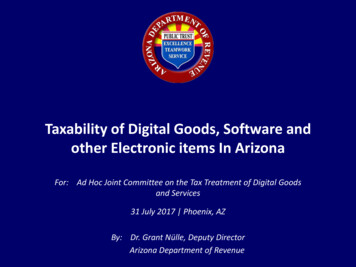
Transcription
Taxability of Digital Goods, Software andother Electronic items In ArizonaFor: Ad Hoc Joint Committee on the Tax Treatment of Digital Goodsand Services31 July 2017 Phoenix, AZBy: Dr. Grant Nülle, Deputy DirectorArizona Department of Revenue
Agenda ADOR Mission, Vision, & High-level Summary Explain TPT and Model City Tax Code (MCTC) classificationsrelevant to software and digital goods Explain Arizona definition of Tangible Personal Property and itsexpansiveness relative to other states Explain authorities and analysis used to determine taxability ofsoftware, digital goods and other electronic items Provide examples of previous guidance, administrativedecisions and settled cases Recommendations & Path Forward2
Mission & VisionPURSUANT TO ARIZONA REVISEDSTATUTES (A.R.S.) TITLES 42 AND 43FY17 ANNUAL OPERATING BUDGET 78.8 MILLION531 Employees
Revenue collections exceeded 14 billionin FY 2016
Revenue distributions primarily fund Stateoperations, cities/towns, & counties
ADOR’s multi-faceted operations touchevery part of Arizona - FY16 Highlights Nearly 5.9M Tax Returns Processed––––1.7M Transaction Privilege Tax193,000 corporate returns3.3M individual income tax returns2.1M individual income tax refunds 78.4 million in Individual Income Tax Fraud Stopped 45,000 new TPT licenses issued 54.9 million in Unclaimed Property Returned Property Tax Unit valued 963 Centrally Valued Properties &Trained 186 Certified County Appraisers6
Overview of Transaction Privilege Taxand its Applicability to Digital Goods
Arizona Transaction Privilege Tax (TPT) GeneralOverview Tax on the privilege of conducting business in Arizona Seller or vendor taxable Seller may pass economic expense to purchaser Generally all of a business’ gross income within one or moreof 16 business classifications is taxable unless specificexemption or deduction exists Exemptions or deductions only available for the specificclassification under which the deduction is provided Deduction under one classification does not apply under anotherclassification unless specifically provided Tax Statutes are construed strictly against a party who claimsan exemption
Privilege Taxes & theModel City Tax Code (MCTC) Municipalities determine own privilege tax base under the MCTC. Have many of the same business classifications as found in State Statute Personal property rental classification is broader than State Statute –MCTC includes licensing of personal property Municipal Tax Code Commission determines changes to MCTC. local options model options Municipalities determine own rates. low of 1% high of 6% Arizona Department of Revenue (ADOR) is the single point ofadministration for State, County, and Municipal Privilege Tax
DOR's 2017 collections exceeding 2016 cities'collections (cumulative thru June 2017)115%Peoria, 111.76%110%Avondale, 107.14%Chandler, 104.71%105%Apache Junction,102.91%Tucson, 104.53%Prescott, 103.20%Tempe , 103.19%Mesa, 103.05%Phoenix, 102.36%Scottsdale, 101.86%Glendale, 99.50%100%Douglas, TUCSON
TPT Classifications & Digital Goods Currently 16 different classifications For software and digital goods only two classesare generally implicated:Rental of TangibleRetailPersonal Property
Retail Classification(A.R.S. § 42-5061 and MCTC §460) Taxes gross income from the sale oftangible personal property (“TPP”)– Excludes professional or personalservice businesses (A.R.S. § 42-5061(A)(1) and MCTC §460(c)(5)).– Excludes services rendered in additionto the sale of TPP (A.R.S. § 42-5061(A)(2) and MCTC §465(c)). Must be separately stated to be excluded
Rental Classification(A.R.S. § 42-5071 and MCTC §450) Tax on gross income derived from the lease of TPP––––Normally ongoing periodic fees collected for use of TPPNon-payment of fees usually means discontinued useLessee normally has exclusive use and control over TPPServices not excluded where connected to lease even ifseparately stated (e.g. installation and delivery charges)unless a separate line of business exists (A.C.C. R15-51502). MCTC exempts separately billed delivery, installation, repair and/ormaintenance charges.
Tangible Personal Property Defined What is TPP?– Defined as “personal property which may be seen,weighed, measured, felt or touched or is in any othermanner perceptible to the senses.” A.R.S. § 42-5001(17). Very Broad Obvious examples:– Paper, pens, computers, CDs, DVDs etc.– MCTC does not define tangible personal property.
17 States have definition of TPP as broad as Arizona, andanother 11 explicitly include software in its broad TPP definitionHow States Define Software WhenTaxing “Tangible Personal Property”Broad DefinitionLess Broad DefinitionBroad, with Explicit Inclusion of Software
Does software and other digital goodsmeet the definition of TPP?
Does TPP include software& other digital goods? ADOR analysis based on statutory definition of TPP and case law Broad statutory definition includes things other than physical goods Music played from a jukebox (State v. Jones, 60 Ariz. 412 (1943)) Arizona case law suggests it is TPP Software considered machinery and equipment (“M&E”) used inmanufacturing (Southwest Airlines Co. v. AZ DOR, 237 Ariz. 50 (2015)) Based on above, the Department has concluded that it does Nevertheless, no Arizona statutes or cases definitive on the issue
Authorities that Determine Taxability ofElectronic Goods – Retail Classification Generally, authoritative guidance distinguishes betweenservices in addition to the sale of TPP. Examples include:– A.A.C. R15-5-154 (Administrative rules have force and effect oflaw/statute) Sale of canned computer software taxable regardless of methodused for delivery Services rendered in addition to sale not taxable– MCTC Reg. 115.1 addresses computer hardware, software anddata services– ADOR Transaction Privilege Tax Ruling (TPR) 93-48 the sale of canned or pre-written software taxable under retailclassification; custom software not taxable (treated as sale of professionalservice)
Other Authorities that Determine Taxability ofElectronic Goods – Retail Classification A.A.C. R15-5-105 Receipts from services rendered in addition to selling TPPsubject to tax unless separately stated on receipt and inrecords ADOR Transaction Privilege Tax Ruling (TPR) 93-31 Exempt services may be excluded from tax base if separatelystated ADOR Transaction Privilege Tax Ruling (TPR) 90-2 In service businesses, services generally geared towardsspecific needs of specific customer Final product which may or may not take tangible form isgeared toward specific customer
Dominant Purpose Test in distinguishing taxable TPPvs. non-taxable services - Retail Classification If the dominant purpose or true object of a transaction is a service,then the transaction is not taxable: (Goodyear Aircraft Corp. v.Arizona State Tax Commissioner, 1 Ariz. App. 302 (1965)) Factors generally considered to determine whether the dominantpurpose of a transaction is TPP or a service Can a customer purchase the service without purchasing TPP? Is the activity geared toward a specific customer and its needs? Is any TPP created by Taxpayer as a result of the services performedfor the specific customer (e.g. lawyer creating will, accountantcreating tax return)? Is the customer seeking out expertise in an area normally consideredthe provision of professional services? Does invoice suggest what is purchased is a service rather than TPP?
Authorities that Determine Taxability ofElectronic Goods – Rental Classification Rentals of digital goods usually implicated when:– Customer pays periodic fee to use the software or otherelectronic good– At end of rental period, customer stops paying fee anddiscontinues use of software or access to the electronicitem is denied
Authorities that Determine Taxability ofElectronic Goods – Rental Classification A.C.C. R15-5-1502– Services in relation to the lease of TPP is included in thetax base whether or not separately stated (this is a majordistinction in treatment between retail and rentals) State Tax Commission v. Peck, 106 Ariz. 394 (1970) Adopted a dictionary meaning of “rental” Exclusive use and control of TPP by customer is required
Authorities that Determine Taxability ofElectronic Goods – Rental Classification Energy Squared v. Arizona Department of Revenue, 203 Ariz. 507 (2002)– No exclusive control found based on specific facts; it was a non-taxableservice where TPP was used in performing service Tanning beds controlled by technician who determined– Whether to commence session– How long session lasted Phoenix v. Bentley–Dille Gradall Rentals, Inc, 136 Ariz. 289 (1983)– Providing equipment with an operator to a customer not taxable sincetaxpayer did not give up possession or control
Other factors that guide ADOR’sanalysis, including sourcing
Other Factors that DetermineTaxability of Digital Goods Additionally, other factors are considered to determinewhether activity is a sale, a rental, or non-taxable. Factors for taxing include:– Software downloaded to a computer;– Software generally used by all customers;– Customer uses software without assistance of taxpayer and canenter its own data and manipulate the software functions to runreports, etc.– Taxpayer only provides technical support to customers to assistwith its use of the software; other than technical supportvirtually no other element of personal services provided
Additional factors for treating an economicevent as a taxable digital good Taxpayer’s income primarily derived from software/digitalgoods as opposed to other services it provides The customer can only obtain the taxpayer’s services if itpurchases the software/digital goods, and the services arebilled with the software/digital goods as one price The taxpayer is normally in the business of providingsoftware/digital goods to its customers The customer has control of the software/digital goods
Factors Against Treating an Economic Activityas a Taxable Digital Good Software created for a specific customer. Taxpayer uses software for the benefit of its customer anduses information from the customer in the use of thesoftware. (e.g. the taxpayer provides information to thecustomer based on the customer’s input). The taxpayer is normally engaged in a service business, but isusing software to more efficiently deliver that service. Customer can use/pay for taxpayer’s services withoutpurchasing software. Other elements of personal services provided by taxpayer. Taxpayer has control of the software or shares control of thesoftware with the customer.
Other Analytical Factors at Play Is there a contract? What does it say? Is there any differencebetween what the contract says and what occurs in practice? Is price for service and software separately stated on theinvoice and on the taxpayer’s books and records? What is the basis of payment? Is there a one-time fee or arepayments ongoing? If payments are ongoing, what happens if the customer stopspaying the fee?
Guidance For Determining Taxability ofElectronic Goods - Sourcing Once an activity is deemed taxable, the taxable income must besourced to a specific jurisdiction Retail– Sales of tangible personal property are sourced to the seller’s location ifthe seller received the order at a business location in Arizona– To the purchaser’s location in Arizona where the seller receives the orderat a business location outside Arizona (A.R.S. § 42-5040) Rental– Gross income sourced to lessor’s business location if lessor has a businesslocation in Arizona and to lessee’s address in Arizona if lessor does nothave a business location in Arizona;– Gross income taxable when property is shipped, delivered, or brought intoArizona for use in Arizona. (A.R.S. § 42-5040, A.C.C. R15-5-1503)
Guidance For Determining Taxability ofElectronic Goods The Department analyzes software and digital goods nodifferently than other forms of TPP.– Downloaded software and other digital or electronic items treated astaxable as if they were purchased from a brick-and-mortar retailer– Where no service included, only issue is whether there is a lease orsale of TPP;– When services involved, the issue is the extent to which such servicesplayed a role in the transaction Goal is to attain equitable treatment for all types ofeconomic activity, regardless of the delivery method(physical vs. digital). User experience is key.
Tax Analysis Examples in the DigitalGoods Space
Digital Goods Questions/AnalysisExample #1 Arizona Private Taxpayer Ruling 02-21 & 02-022.– Electronic program guides, specialized electronic televisionviewing guides, and programming content specificallycreated by Taxpayer constituted information services andwere not taxable.– Software updates taxable as retail sales.– If not separately stated, the entire amount for both istaxable.
Digital Goods Questions/AnalysisExample #2 Arizona Private Taxpayer Ruling 95-010.– Licensing of software taxable sale of TPP regardless of themethod of transmittal Software enabled high volume paper scanning and a multimediapresentation package that allowed users to present scanneddocuments, photos, charts, slides etc.
Digital Goods Questions/AnalysisExample #3 Arizona Private Taxpayer Ruling 04-010.– Gross income derived from software license leased toArizona customers taxable when the software storedoutside Arizona, but used in Arizona by customer.– Fees from extranet hosting taxable if service is directlyrelated to the software lease.– Such service not taxable as professional service if notrelated to any software lease or rental by Taxpayer.
Digital Goods Questions/AnalysisExample #4 Arizona Private Taxpayer Ruling 05-008.– Sale of real-time tracking software used to operate devicewas taxable retail sale.– Activation fees and subscription fees not taxable as servicein addition to sale of tangible personal property.– Rental of tracking device taxable as lease; activation feesand subscription fees also included as part of taxablerental income.
Digital Goods Questions/AnalysisExample #5 Arizona Private Taxpayer Ruling 07-006.– Gross receipts derived from hosting software for client nottaxable under retail classification. However, licensing ofsoftware taxable. Hosting included:– access to taxpayer’s computer network,– ability to store and retrieve data on taxpayer’s computer network– data backup and file maintenance.
Digital Goods Questions/AnalysisExample #6 Arizona Private Taxpayer Ruling 08-006.– Internet membership club offering coupons, discounts,identity theft protection, credit monitoring andnewsletters for a monthly fee not taxable.– Arizona does not tax the sale of advertising
Digital Goods Questions/AnalysisExample #7 Arizona Private Taxpayer Ruling 12-003.– Site Fees covering access to website taxable as rental oftangible personal property when collected from Arizonacustomers.– Fees included: computer simulation programs, virtual environments from third-party vendors, access to virtual organizations (e.g., computer labs), tutorialservices in math and writing, and library content that enabled students to access multiple researchdatabases
Digital Goods Questions/AnalysisExample #8 Arizona Private Taxpayer Ruling 15-001.– Business providing electronic backup, storage and retrieval (i.e.hosting) of its customer’s content and data on its network through theuse of specific software that required the customer to downloadinterface software to establish a connection taxable. Software performed backup functions automatically Files deleted from taxpayer’s server once customer no longer required it orstopped paying the fees. No services other than technical support performed by taxpayer (thoseservices were inconsequential) Customers themselves were able to operate the backup software, albeitremotely.
Director’s Decisions and Settled Cases Director’s Decision 201400197-S (10/27/15)– Subscription income from online database was subject to transactionprivilege tax under the state and city personal property rentalclassifications.– Taxpayer’s customers had sufficient use and control when accessingand manipulating the Taxpayer’s online database to qualify as rentalunder the personal property rental classification– This case was ultimately resolved through a closing agreement Settled cases– There are no other settled cases to reference at this time but there arecases currently in the Administrative Appeal process.
Role for Public Policy Input More public guidelines required to provide clarity fortaxpayers and address increasingly complex situations– Most ADOR issued guidance is in the form of private letter rulings thatare specific to a taxpayer requesting it; cannot be relied on by othertaxpayers– Business structures and types of products offered becoming morecomplex and difficult to categorize SaaS (customers using provider’s applications on cloudinfrastructure,) PaaS (customers deploy their own software using provider’sprogramming languages, libraries, services etc.), IaaS (customers access provider’s processing, storage, networksand other computing resources and deploy their own operatingsystem) models difficult to analyze with existing framework.
Other Areas of Need: Remote Access Remote Access situations – Sourcing– Retail sales -sourced to location of business if orderreceived in Arizona and to customer’s location where orderreceived outside Arizona– Rentals - Unclear how sourcing should be handled forrentals where remote access implicated gross receipts “taxable when property is shipped, delivered, orotherwise brought into the state for use in in this state” (A.R.S. §42-5040(C)(2))– Suggests property must be in Arizona to be taxable as rental
Functionality or Code driven analysis? Remote Access situations – control over functionalityor code?– Retail is generally clear - all ownership in the property is vested in thepurchaser who may do whatever he/she wishes with the software ordigital good– Rental is problematic – customer must have exclusive possession orcontrol over the TPP– Is control over functionality or code? Department has focused on control over functionality and being able touse software as if downloaded Whether sufficient “possession, use and control” can be exercised over TPPin remote access situations
Competitive Environment & Fiscal Impact of taxlaw changes must be carefully considered Tax policy changes tend to create winners & losersamong businesses General Fund revenue affected by changes to TPT Nature of TPT makes estimating revenue changesextremely challenging– Tax imposed on Gross Income, not on individual transactions– Information asymmetry between potential beneficiaries of taxlaw changes & estimators of revenue impacts– Revenue impacts can be significant and unanticipated Recommend that any proposed exemptions should be cappedat an acceptable amount, and conditionally repealed if costof exemption exceeds acceptable amount.
Where to from here? Create broad policy statement oftaxable and non-taxable activities,taking into account currentlandscape of software and digitalgoods offerings and existingauthorities. “Count the Cost” of recommendedchanges. If necessary, amend statutes(including statutes dealing withmunicipal taxes) to reflect policy andprovide clarity to taxpayers.
THANK YOU!
Jul 31, 2017 · Model City Tax Code (MCTC) Municipalities determine own privilege tax base under the MCTC. Have many of the same business classifications as found in State Statute Personal property rental classification is broader than State Statute – MCTC includes licensing of personal property Municipal Tax Cod
